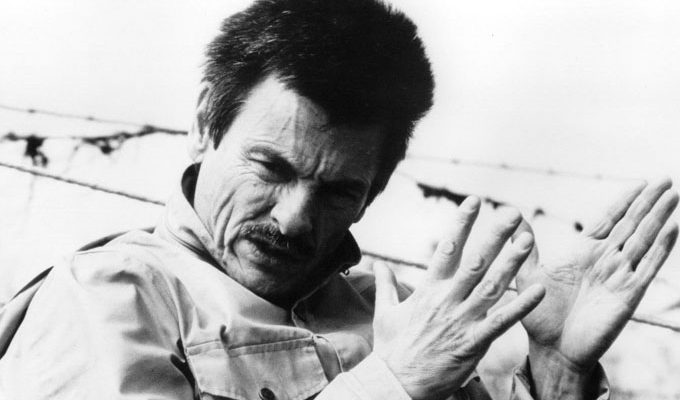 “Andrei Rublev” (1966)
“Andrei Rublev” (1966)
Considering that cinema is now firmly established as an art form, it’s curious that it doesn’t really deal well with art as a subject: films about writers, musicians, painters and even other filmmakers tend to be simplistic and reductive. The great (in every sense) exception is “Andrei Rublev,” which, across a three-hour-plus running time, episodically dramatizes the life of the great medieval Russian painter of religious icons. But don’t make the mistake of thinking that will mean the film itself is picturesque: the world Tarkovsky depicts is brutal, senseless and chaotic (the famous death of a horse scene ensures it’s not a film for animal lovers). But like his protagonist, the director finds beauty in the darkness, from the flight in a hot-air balloon in the film’s prologue, to the astonishing, unbroken wide shot of the bell being raised at the climax, the incident that convinces Rublev to return to painting. Most importantly, it’s a film about the role of an artist in the world around him: it’s clear from the arrest of a jester in an early scene that this is no happy climate for the creative type, and Rublev watches without complaint, but, after turning away from art for much of his life, he’s eventually persuaded that what he does has real value, that it is a necessity. And when the end of the film shows Rublev’s work (the only part of the film in color), no one could disagree. Unsurprisingly, the authorities weren’t happy with Tarkovsky’s finished film: it wasn’t released in the Soviet Union until 1971, in a cut-down edit, and only made it to the States two years later in an even more brutalized version. But the Criterion Collection released the original cut in 1999, solidifying the film’s reputation — The Guardian last year voted it the second greatest of all time. Fun, slightly baffling fact: co-writer Andrei Konchalovsky went on to direct “Tango & Cash.” [A+]
 “Solaris” (1972)
“Solaris” (1972)
Tarkovsky’s follow-up to “Andrei Rublev” is rarely mentioned in a sentence without the word “2001” cropping up at the same time. But, aside from being a thoughtful, spiritual, meditatively paced science fiction film, based on a novel by one of the genre’s greats (Polish writer Stanislaw Lem), they have little in common: as J. Hoberman once pointed out in The Village Voice, the film in fact bears more resemblance to another critical darling, Alfred Hitchcock‘s “Vertigo.” There are no gadgets or CGI to be found, just people, in the story of Kelvin, a psychologist sent to investigate bizarre happenings on a space station that orbits the ocean planet Solaris, only to be greeted there by a manifestation of his late wife, who killed herself years earlier. For all of its fearsome reputation and running time, it’s a simple tale of grief and lost love, albeit one spiced up with sci-fi questions of identity, and the nature of humanity. Hari, Kelvin’s wife, is constructed from neutrons, but has all the memories, thoughts, and feelings of her deceased counterpart — does that not make her just as human? It’s a devastating tale (Hari’s second suicide attempt is truly wrenching), and arguably Tarkovsky’s most deeply felt story. There’s an argument to be made that Steven Soderbergh‘s 2002 remake is the superior film — at almost half the length, it’s a tighter, more focused picture, that doesn’t lose anything truly essential — but to cut down the original would be madness: as in all of his work, the best moments, like the languid, earth-bound opening, or the stunning zero gravity sequence, are near-transcendent. Soderbergh would later state he was adapting the novel, not remaking the film “Solaris,” and compared Tarkovsky’s picture to a “sequoia,” while his was “a little bonsai.” [A]
 “Mirror” (1975)
“Mirror” (1975)
Working in a deeply personal, stream-of-consciousness fashion (a distant ancestor of Terrence Malick‘s “The Tree of Life” for sure, except without malicious dinosaurs), Tarkovsky’s penultimate Soviet film eschews traditional plot and instead works at its own rhythm and logic, directly correlating with the filmmaker’s sentimental beating heart. Shifting between three different periods (pre-war, war, and post-war) the film’s narrator looks back on his life while on his deathbed, dreaming of everything including arguments with his ex-wife and a rather stressful moment involving his mother at her proof-reading day job. Deemed incomprehensible and unreleasable by Gosinko, Russia’s state committee for cinematography, “Mirror” is an astonishingly affecting cinematic composition, a dense film surprisingly devoid of the difficulties that slow-moving minimalist narratives tend to require. This could be due to Tarkovsky’s knack for honing in on the essence of a particular moment, be it an odd televised seance involving a stuttering boy being cured of his impairment (which also has to be one of the best openings on celluloid) or the simple act of a maternal figure washing her hair in a basin. Or it could simply be the sheer mastery of the medium on display, as his “sculpting in time” cinematography and aural sound design (both the selection of classical music and attention to nature’s tunes) have never been better. This isn’t just someone’s soul captured on film stock, it’s life at its purest; a certified masterpiece through and through. [A+]

